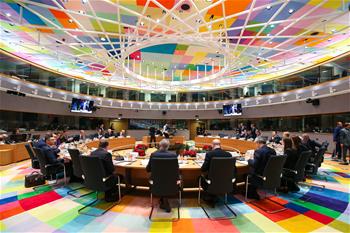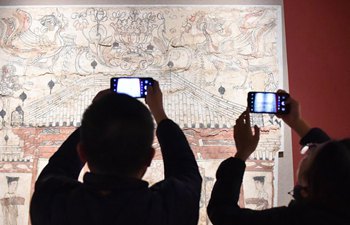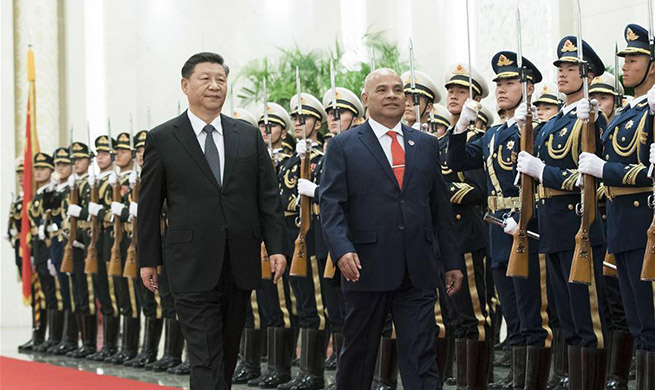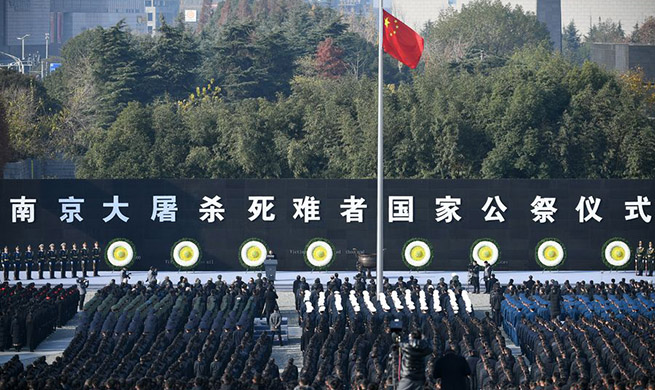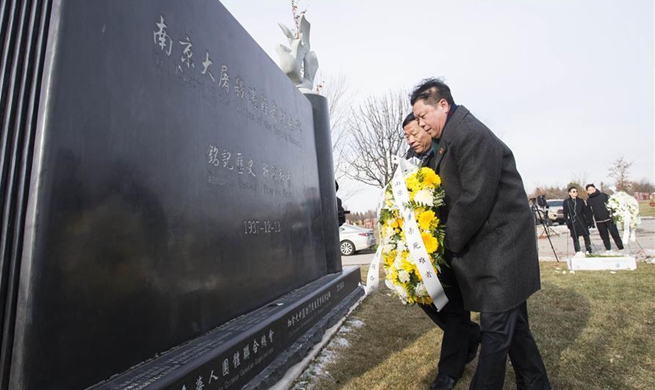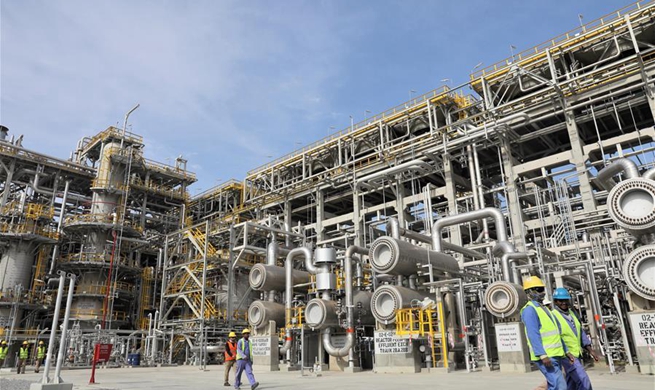BEIJING, Dec. 13 (Xinhua) -- Since its return to China in December 1999, Macao has charted a long journey of growth that has drawn the gaze of observers from around the world.
The two decades saw Macao evolve from a small town with a sluggish economy and a lack of social security to a world-renowned metropolis with political stability, social harmony, economic prosperity and cultural diversity.
Macao's GDP and GDP per capita had grown by almost eight times and five times from 1999 to 2018, respectively, and its fiscal reserves and foreign reserves had grown 193 fold and 6.2 fold, with the unemployment rate also dropping from 6.3 percent to 1.8 percent.
While the figures may appear abstract, the sense of fulfillment of the people of Macao has been concrete.
Seventy-five-year-old Chen Yulian is a volunteer worker at an elderly service center in Macao, who regularly visits and calls elderly people living alone and has gone through significant changes in her life over the past 20 years.
Before Macao's return, Chen's family of three had to settle in a 70-square-meter housing unit together with another two families, where the only toilet was shared by 11 people.
Chen, a tailor at the time, and her husband, a construction worker, struggled to make ends meet even though they worked from dawn to dusk, and had to take on part-time jobs to support the family.
"Before the return of Macao, all the legal documents were written in Portuguese. We had to pay for translation to handle paperwork with the authorities," said Chen.
The security situation at that time was dire -- gang violence was running wild, and women were too afraid to go out at night, she recalled.
"When accidents happened at my husband's construction site, workers weren't protected by insurance," Chen said, adding that the people in Macao had almost no welfare back then.
Today, however, Chen has access to free medical care, as all people aged above 65 do in Macao. They can also receive a monthly pension of about 6,000 patacas (about 750 U.S. dollars).
Chen's son is optimistic about the development prospects of Zhuhai, a city of the neighboring Guangdong Province on the mainland, and has bought a house in Hengqin of Zhuhai, which is a doorway to Macao. Her two grandsons both enjoy free education, with the elder one already enrolled in the Xinghai Conservatory of Music in Guangzhou.
"Looking back on the past, I feel so proud as a Chinese," Chen said. "Only when our homeland does well can Macao fare better."
With her life improving, Chen has grown fond of traveling around with her husband. Her family visited the Hong Kong-Zhuhai-Macao Bridge as soon as it was put into use last year, have been to several cities in the Guangdong-Hong Kong-Macao Greater Bay Area, and have also toured places like Beijing, Shanghai and Jiangxi Province.
Since Macao's return to the motherland, the Macao Special Administrative Region (SAR) government has been working hard to improve the people's wellbeing, with achievements made in various aspects, including:
-- The monthly median income of Macao's employed residents rose from around 5,000 patacas at the time of the return to 16,000 patacas in 2018;
-- Since 2007, children in Macao have been able to enjoy 15 years of free education covering the period from kindergarten to high school;
-- Under the public housing scheme of the Macao SAR government, 51,000 public housing units have been constructed to meet the requirements of middle- and low-income residents;
-- The SAR government has been handing out cash to both permanent and non-permanent residents of Macao for 12 years in a row, now 10,000 and 6,000 patacas for a permanent and non-permanent resident respectively a year;
-- The average life expectancy of Macao residents has reached 84 years.
Behind the substantial improvement of people's welfare lies Macao's rapid and continuous economic development for two decades.
"The past 20 years have witnessed the fastest and greatest development in Macao's history, with macroeconomic indicators showing brilliant performance," said Fu Ziying, director of the Liaison Office of the Central People's Government in the Macao SAR.
In recent years, Macao has accelerated its cultivation of emerging industries in addition to maintaining the steady development of the gaming and tourism industries.
By the end of 2017, the total added value of Macao's emerging industries, including the conference and exhibition industry, the financial industry, the traditional Chinese medicine industry and the cultural and creative industry, had increased by 23.6 percent from 2015, accounting for over 8 percent of the total added value of all industries.
"As of today, the basic structure of a moderately diversified economy has taken shape in Macao," said Leong Vai Tac, secretary for economy and finance of Macao.
Since Macao's return to China, the region is run by Macao compatriots who enjoy unprecedented democratic rights and extensive freedom in accordance with the law, with four Chief Executive elections and five Legislative Assembly elections successfully held.
As of the end of 2018, the number of voters in Macao reached 314,000, a sign of local people's increasing political participation.
Over the past 20 years, Macao has enjoyed steady political and economic development and social stability, its residents have led relatively affluent lives, and its social security system has been relatively sound, all demonstrating the vitality of the policies of "one country, two systems," "the people of Macao governing Macao" and the high degree of autonomy.







